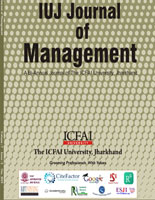Animesh Karn,Dr. Pallavi Kumari
Keywords : : Signaling Theory, Credential Inflation, Workforce Misalignment, Higher Education Market, Human Capital, Positional Good
EOI : eoi.citefactor.org/13.11224/IUJ.13.01.01



 The IUJ Journal of Management (IUJ-JOM) is the flagship journal of ICFAI University Jharkhand, Ranchi.
The aim of the journal is to provide insight into the business and management research. It also creates
a platform for the researchers, academicians, professors, practicing management professionals and proponents
in disseminating original,
The IUJ Journal of Management (IUJ-JOM) is the flagship journal of ICFAI University Jharkhand, Ranchi.
The aim of the journal is to provide insight into the business and management research. It also creates
a platform for the researchers, academicians, professors, practicing management professionals and proponents
in disseminating original,
theoretical and applied research in the field of management and allied disciplines. The Journal is a Bi-Annual, . . . . .Read more.
 This study examines the growing applicability of signaling theory in understanding the US higher education market’s structural challenges. Analyzing current trends through the signaling lens reveals how credential inflation, workforce misalignment, and financial unsustainability stem from education’s dual function as human capital investment and positional good.
Read more.
This study examines the growing applicability of signaling theory in understanding the US higher education market’s structural challenges. Analyzing current trends through the signaling lens reveals how credential inflation, workforce misalignment, and financial unsustainability stem from education’s dual function as human capital investment and positional good.
Read more.
 The Indian Knowledge System (IKS) represents a vast and sophisticated tapestry of intellectual traditions, pedagogical models, and ecological wisdom that has evolved over millennia. This paper undertakes a literature-based review to critically examine the conceptual, historical, and pedagogical dimensions of IKS, with a particular focus on its contemporary relevance and research potential.
Read more.
The Indian Knowledge System (IKS) represents a vast and sophisticated tapestry of intellectual traditions, pedagogical models, and ecological wisdom that has evolved over millennia. This paper undertakes a literature-based review to critically examine the conceptual, historical, and pedagogical dimensions of IKS, with a particular focus on its contemporary relevance and research potential.
Read more.
 Since the advent of management thoughts and ideas to make people work more effectively, we have indeed travelled a long way. From the early 20th century,
Read more.
Since the advent of management thoughts and ideas to make people work more effectively, we have indeed travelled a long way. From the early 20th century,
Read more.
Subscribe now to get notified about IU Jharkhand journal updates!
Animesh Karn,Dr. Pallavi Kumari
Keywords : : Signaling Theory, Credential Inflation, Workforce Misalignment, Higher Education Market, Human Capital, Positional Good
EOI : eoi.citefactor.org/13.11224/IUJ.13.01.01
Dr. Pallavi Kumari,Dr. Anjan Niyogi
Keywords : Indian Knowledge System, Indigenous Pedagogy, Pramāṇa, Social Inclusion, Sustainable Traditions
EOI : eoi.citefactor.org/13.11224/IUJ.13.01.02
Indranil Barat,Dr. Harkirat Singh Bal
Keywords : Spirituality, Workplace Spirituality, Human Resources, Industrial Psychology, Individual Psychology, Motivation, Teamwork
EOI : eoi.citefactor.org/13.11224/IUJ.13.01.03
Dr. Pritha Chaturvedi ,Prof. Sumit Kumar Sinha
Keywords : ESG compliance, regulatory framework, SEBI, RBI, Ministry of Corporate Affairs, Business Responsibility and Sustainability Reporting, corporate governance, sustainable finance, India
EOI : eoi.citefactor.org/13.11224/IUJ.13.01.04
Dr. Harkirat Singh Bal,Indranil Barat
Keywords : Exercise, Fitness, Technology, Smart Devices, Health
EOI : eoi.citefactor.org/13.11224/IUJ.13.01.05
Bishnu Charan Parida
Keywords : Emotional Intelligence, Workplace Adaptability, Adjustment, Performance
EOI : eoi.citefactor.org/13.11224/IUJ.13.01.06
Amitava Pal,Dr. Kavita Mathad,Dr. Amruta Deshpande
Keywords : Biodiversity Credits, Circular Economy, Climate Resilience, Corporate Governance, ESG Innovation, ESG Reporting & Transparency, Future of Sustainability, Green Bonds & Sustainability-Linked Loans, Impact Investing, Regenerative Business Models, Responsible Investing, Sustainable Finance, Sustainable Supply Chains, UN Sustainable Development Goals (SDGs)
EOI : eoi.citefactor.org/13.11224/IUJ.13.01.07
Dr. Ratish C Gupta, Mahak Gupta
Keywords : Customer Responsiveness, Indian Hospitality Sector, Service Quality, Demographic Influence, Customer Satisfaction
EOI : eoi.citefactor.org/13.11224/IUJ.13.01.08
Prof Dr S Sandhya,Col Prof Dr J Satpathy
Keywords : Decision Dynamics, Decision Techniques and Decision Dynamics
EOI : eoi.citefactor.org/13.11224/IUJ.13.01.09
Col Prof Dr J Satpathy,Prof Dr S Sandhya,
Keywords : Behavioral - Management Pointers, Decision Mosaic and Neuro ‘Drivers’
EOI : eoi.citefactor.org/13.11224/IUJ.13.01.10
Dr. Manisha Pallavi Chauhan,Dr. S .S .Prasada Rao
Keywords : digital payment methods, Credit cards, electronic wallets, and Commercial banks.
EOI : eoi.citefactor.org/13.11224/IUJ.13.01.11
